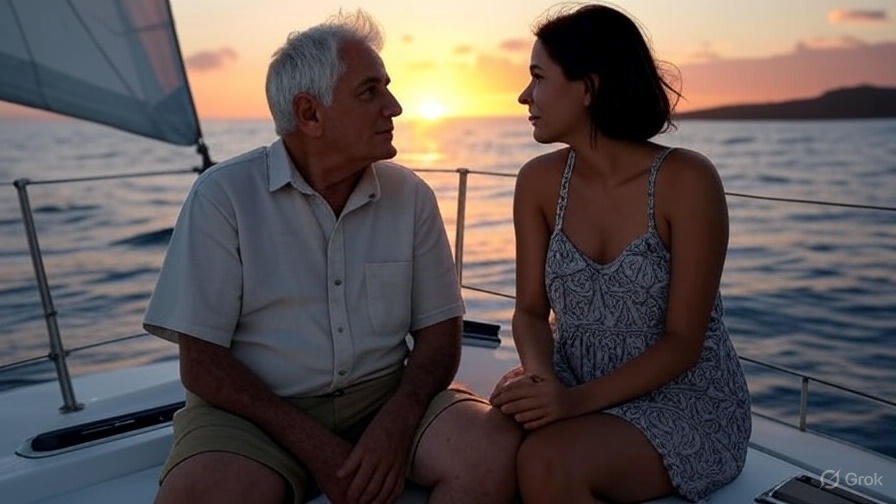In the sultry haze of a Coconut Grove evening nearly half a century ago, Ron Rose, a 26-year-old with a mop of sandy brown hair and piercing blue eyes, met a precocious 10-year-old named Robin Corcoran. She stepped out of her parents’ rental car, sized him up with a Bostonian lilt, and declared, “You look like Prince Chah-ming.” It was a moment that would spark a connection spanning decades, leading from a chance encounter to a thriving business and a masterful exit strategy.

The Corcorans, fresh from a Caribbean cruise where they’d bonded with Ron’s parents, were in South Florida for a few extra days. The Rose’s welcomed them for dinner, and over three sun-drenched days, young Robin trailed Ron like a shadow. A recent college grad working in insurance, Ron had little interest in kids, but Robin’s wit and charm captivated him. He spun stories for her, marveling at her grown-up wisdom trapped in a child’s frame. When the Corcorans returned to Boston, the families stayed in touch, their friendship a quiet thread through the years.
Life moved on. Ron fell hard for a Latin beauty, married, and watched the initial passion erode under life’s grind. By 40, he was single again, their decade-long marriage a memory. Then fate intervened. In the early 1980s, Robin, now a vibrant young woman pursuing a hotel management degree in Miami, reentered his life. The Rose’s invited her to dinner, and Len, curious, dropped by. The clever girl had blossomed into a witty, gorgeous adult, still wise beyond her years. On a porch swing that night, under the flicker of distant lightning, Robin confessed her childhood crush. “You were so handsome… and sweet,” she said, gazing into his eyes. “You still are.” A kiss followed, and within a year, they were married.
Robin set aside her degree to raise their two children and join Ron in his fledgling business, crafting group health insurance plans and employee benefits for small companies. Their personal touch and Ron’s innovative human resources software fueled steady growth. By the time Ron turned 73, their firm was pulling in $2 million annually, netting them $600,000 a year. But retirement loomed. Ron was ready to step back, while Robin, at 56, wanted to keep working for another decade. They devised a plan to transfer the business to two trusted employees—a salesman and an administrator—over time, ensuring a smooth transition.
Enter Peter and Noah, their financial advisors. Peter crafted a strategy to gradually shift ownership to the employees via a note for shares, retaining control until Ron and Robin were fully paid. It was a solid plan, but an industry conference changed everything. Over dinner with a representative from a large firm known for acquiring small businesses, Ron and Robin received a $7 million offer. It was tempting but flawed—paid out over six years, diminished by taxes. Peter analyzed it: good, not great. Their employee transfer plan seemed stronger, given their steady revenue. But Peter had an ace up his sleeve: Noah, the “quarterback coach.”
“Noah literally wrote the book on this,” Peter told Robin, explaining how Noah’s broad perspective was like a coach in the press box, guiding the quarterback—Ron and Robin—with a clearer view of the field. Noah saw untapped potential in their software, a unique tool that automated everything from enrollment to prescription transfers. “Your software’s a business in itself,” he said. “You’re giving it away. Let’s pull it out, license it, and put it in a trust for your kids and grandkids. Then sell the company, but not the software.”
Noah’s playbook was a game-changer. He pitched the business to three firms, securing a cash offer from one that also agreed to license the software for use across its portfolio. The deal was a triumph: Ron and Robin got immediate payment, future licensing revenue, and shared some proceeds with their loyal employees. The buyer leveraged the software to win more clients, boosting everyone’s bottom line. In the first year, licensing earned $60,000, projected to hit $200,000 within a few years.
As Ron and Robin reflect on their journey—from that Coconut Grove meeting to a multimillion-dollar exit—they credit love, hard work, and Noah’s strategic vision. “It was a great day for the quarterback coach,” Peter said, grinning. “Now he can take off his cape and have dinner with his kids.” For Ron and Robin, it’s a legacy that will keep giving, ensuring their family’s future while leaving a mark on the industry they helped shape.
Download our free Wealthrive Fire Drills HERE.





